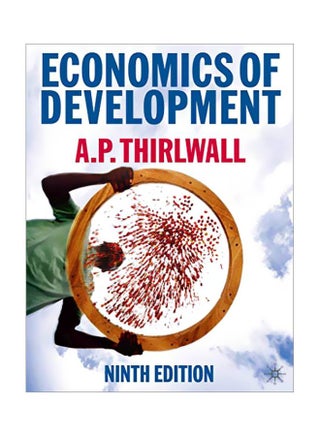| المراجعة التحريرية | Thirlwall sets the standard for a rigorous undergraduate development text.' Professor Gregg Huff, Senior Research Fellow, Pembroke College, University of Oxford 'Congratulations on producing such a wonderful book for generations of students who are interested in economic development.' Ligang Song, Associate Professor and Director: China Economy Program Crawford School of Economics and Government, The Australian National University 'Tony Thirlwall's latest edition is to be welcomed by anybody who teaches undergraduate development economics. With a new and more accurate title, Economics of Development provides thorough coverage of the major issues and theories in an easy to read style. The core equations for important models are clearly explained and illustrated with diagrams and recent data. Chapter 5 on 'Theories of Economic Growth' exemplifies the style: a history and exposition of theories from Adam Smith to the most recent growth diagnostics. A new chapter is added on the role of institutions and democracy. This will be a valuable textbook for lecturers and students.' Professor Oliver Morrissey, School of Economics, University of Nottingham 'For students and teachers who want an authoritative, comprehensive, balanced and analytically-rigorous guide to the subject of development economics, there is no need to look any further. Thirlwall's book, which I read as an undergraduate in the 1970s, has matured gracefully over the years but also maintains the freshness of youth, covering not only the classic themes of development economics, such as surplus labor, center-periphery analysis, and structural change, but also currently-fashionable ideas about institutions and development, new growth theory, and debates on globalization. While it tackles the analytical and technical aspects of the subject very well, it never loses sight of the big picture and the real meaning of economic development.' Amitava Dutt, Professor of Economics and Political Science, University of Notre Dame 'Thirlwall's textbook is a classic. It successfully distils complex concepts for the non-specialist reader, but more importantly, it inspires that same reader to become a development economist herself.' Karna Basu, Associate Professor, Department of Economics, Hunter College, City University of New York |
استرجاع مجاني وسهل
أفضل العروض

